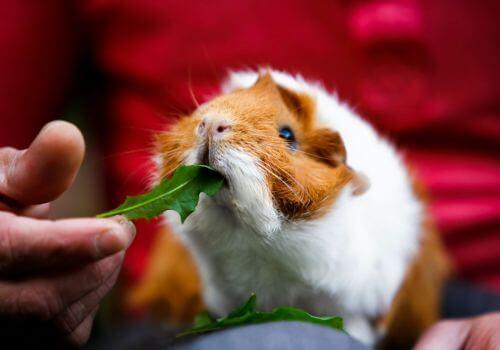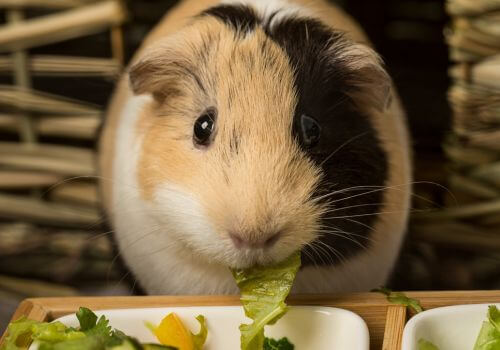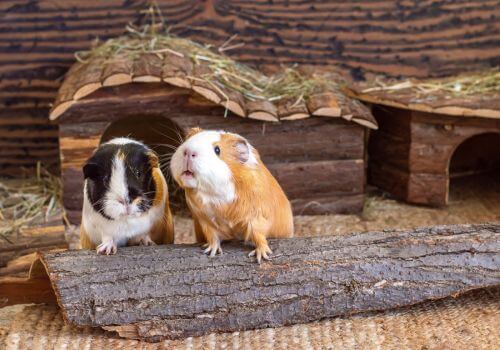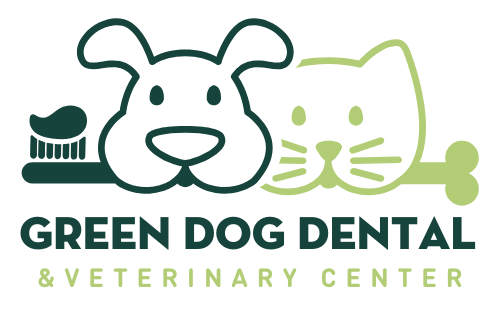
Guinea Pig Care
If you are considering adding a guinea pig to your family or currently have a guinea pig as a pet, our team at Green Dog Dental - Veterinary Center is here to support you and your wheeking pal. We offer pocket pet health care, along with other exotics, and understand their unique and sometimes delicate needs. We know guinea pigs can be great pets for families and individuals alike, but they need special health care to keep them healthy and happy. As a practice that sees guinea pigs regularly, we want pet parents to feel confident about day-to-day husbandry, nutrition, behavior, and when to seek medical care for their pet. If you have questions at any point, our team at Green Dog Dental - Veterinary Center in Van Nuys, CA is here to help! You can always call us at (310) 606-2407.
Guinea Pig Basics
Guinea pigs, or cavies as they’re affectionately called, are cheerful and friendly little rodents that usually live between 4 to 8 years, with around 5 years being the average in a caring home. They’re known for their sweet and gentle nature, rarely biting, and their fun vocal personalities, which make them a great fit for families ready to learn how to care for them. Their love for routine and playful social interactions can really resonate with kids, just as long as there’s an adult around to help out.
Because of their relatively small size and straightforward housing requirements, guinea pigs are easier to manage than many larger pets. These socialable pets also come in a wide range of coat types and patterns, from English/Common (short hair) to Abyssinian (rosettes) and Peruvian (long hair), along with many mixes of coats and colors. Learning about your cavies' requirements is the first step in optimal care, so let's discuss what your pet needs to thrive.
Your Guinea Pigs' Ideal Habitat
Did you know guinea pigs can't climb? That's right, guinea pigs are ground-dwelling, non-climbing animals that need ample floor space. An absolute minimum is about 200 square inches of floor area for one cavy, but larger is strongly recommended. There are a lot of options for cages and enclosures for rodents, but the two basic rules are to choose a solid floor enclosure (no wire bottoms) to protect their feet, with sides ~10 inches high. Aquariums can be a popular choice for pet parents, but they are discouraged due to poor ventilation.
- Bedding: Use paper-based bedding or kiln-dried aspen shavings. Avoid cedar and non–kiln-dried pine because aromatic oils can irritate the respiratory tract and skin. Spot-clean daily and refresh bedding frequently to control odor and ammonia.
- Placement & temperature: Keep cages indoors in a quiet, draft-free area out of direct sun. Guinea pigs tolerate cool better than heat; aim for 65–79°F with good airflow to prevent heat stress.
- Water: A sipper bottle mounted outside the cage helps keep water clean. Check the nozzle daily for clogs (pellets, hair, mineral deposits) and wash the bottle regularly with hot, soapy water; rinse thoroughly.
Guinea Pig Nutrition and Vitamin C Requirements
Once you’ve created a safe and comfortable home for your guinea pig, the next step is making sure their diet supports their health. Guinea pigs are strict herbivores and cannot make their own Vitamin C, so they require it from their diet every day. Let’s take a closer look at what guinea pigs should eat, what to avoid, and how to provide a diet that supports long-term health.

- Unlimited grass hay: Provide fresh timothy, orchard, or other grass hay at all times for dental wear and healthy gut motility. Alfalfa hay is generally too high in calcium for healthy adults, but may be used for growing youngsters or special medical needs under veterinary guidance.
- Leafy greens & veggies: Offer a rotating variety: red/green leaf lettuce, cilantro, parsley, bell peppers (great Vitamin C), dandelion greens, endive, and carrot tops. Introduce new foods gradually to avoid GI upset.
- Pellets: Choose a plain, timothy-based guinea pig pellet fortified with Vitamin C (no seeds, corn, or colored bits). Because Vitamin C degrades over time, use pellets within ~90 days of the mill date.
- Fruits & treats: Fruit (like a slice of apple or a grape) should be an occasional treat only, generally no more than ~5% of daily intake. Skip sugary commercial “yogurt drops.”
- Supplements: Many cavies need additional Vitamin C (often 10–30 mg/day). We typically recommend tablets or sprinkling the correct powdered dose onto greens rather than adding vitamins to water (they degrade quickly and may alter taste).
- Foods to avoid: Onions, garlic, iceberg lettuce, chocolate, seeds/nuts, and processed human foods. Sudden pellet brand changes can upset the GI tract; therefore, it's best to transition slowly.
Our team at Green Dog Dental - Veterinary Center will discuss your pet's nutrition at every visit and help you tailor the diet based on age, weight, and medical history.
Guinea Pig Health and Veterinary Care
Do guinea pigs need to go to the vet? Yes! Your guinea pig should have an annual wellness exam, and every six months for seniors or cavies with ongoing conditions. Because they are a prey species, like rabbits, they often hide signs of illness until they are severely affected. Regular checkups help us catch problems early, especially dental disease and nutrition-related issues like scurvy from Vitamin C deficiency.
- Choosing a vet: Look for an exotic companion mammal veterinarian who routinely sees guinea pigs. Not all practices are equipped for cavy care.
- Vaccinations: In many regions there are no routine vaccines for guinea pigs, so prevention focuses on diet, husbandry, and prompt care if problems arise.
- Parasites: Cavies can get mites and lice; scratching, hair loss, or scabs warrant a visit. Only use treatments prescribed for guinea pigs.
- Preventive care: Nail trims, weight tracking, dental checks, and fecal screening are part of a solid wellness plan.
Common Guinea Pig Health Concerns
Guinea pigs can become ill quickly, so it’s important to reach out to us right away if you notice any of the following signs:
- Eating less, drooling, pawing at the mouth, weight loss (possible dental disease)
- Rough coat, lethargy, painful joints, or poor wound healing (possible Vitamin C deficiency/scurvy)
- Itching, hair loss, crusts or scabs (mites/lice)
- Sneezing, discharge, labored breathing (respiratory infection)
- Diarrhea, very small or absent fecal pellets, bloating (GI disease)
GI stasis or severe breathing changes are urgent. If you’re worried, call (310) 606-2407 right away.
Behavior, Activity, and Enrichment for Your Guinea Pig
Because guinea pigs are active, social animals, they thrive on consistency and interaction. They do best with a predictable daily routine for feeding, playtime, and handling, which helps them feel safe and secure. Cavies are also quite vocal, using a variety of sounds to communicate with their people and with each other. Excited “wheeks” usually mean your guinea pig is looking forward to food, while softer purrs are a sign they’re relaxed and content. Louder squeals or sharp squeaks can signal fear or stress, so learning what these sounds mean and giving your guinea pig safe ways to express themselves aids in keeping them happy and healthy.

- Floor time: Offer supervised play in a penned, chew-proof area (no accessible cords, baseboards, or houseplants). Smooth floors make cleanup easier!
- Hideouts & tunnels: Provide multiple shelters so cage mates can avoid each other as needed to help reduce stress.
- Foraging & chew toys: Safe cardboard, paper bags filled with hay, and willow/untreated wooden chews support natural behaviors and dental wear and offer mental stimulation.
- Handling: Many guinea pigs prefer lap time to being carried around. Slow, calm approaches build trust.
- Pairs & groups: Same-sex pairs often do well; introductions should be gradual with neutral territory and multiple resources.
- Daily life: Cavies are most active during the day and evening and prefer steady, calm environments (not total darkness). Covering the cage at night is usually unnecessary unless it reduces drafts or stress.
Guinea Pig Care at Green Dog Dental - Veterinary Center
At Green Dog Dental - Veterinary Center, we understand how special cavies are. Whether you’re setting up your first habitat, planning a healthy diet, navigating bonding, or noticing a potential health concern, our veterinary team is a trusted resource for guinea pig care in Van Nuys, CA. We offer wellness exams, dental and GI health guidance, parasite prevention, and urgent care for time-sensitive issues.
If you live in or near Van Nuys, CA, and are looking for pet care, contact us at (310) 606-2407 to set an appointment. You can also email us at [email protected]. Our staff would love to talk with you!
Don't forget to follow us on social media: Facebook, Instagram.
